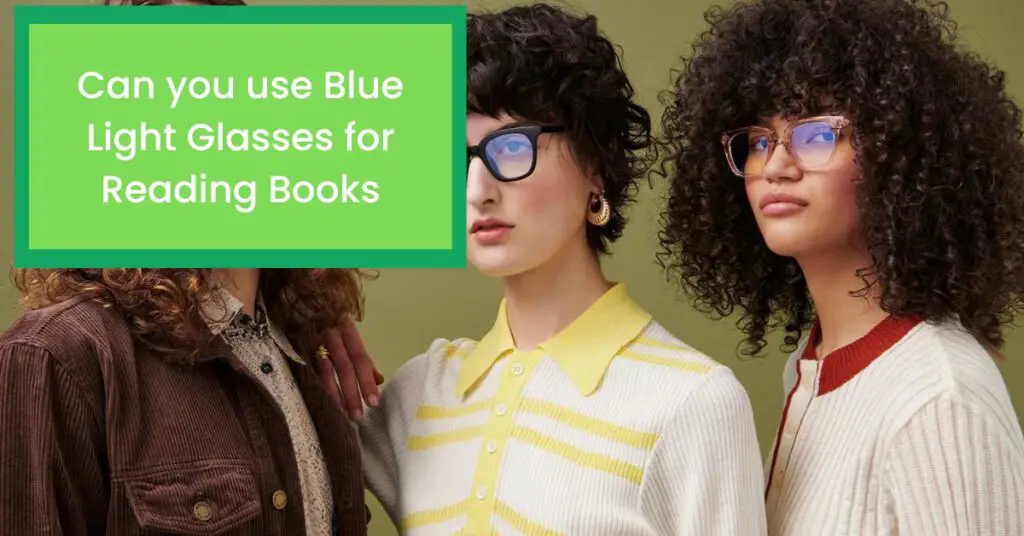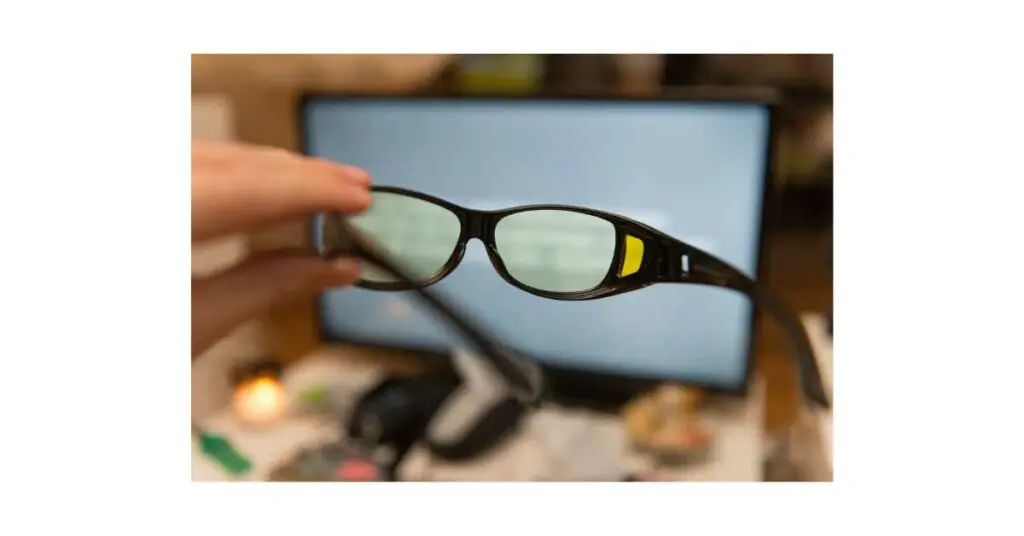As the short answer, blue light glasses will not help you read books. The long answer is a bit more complicated.
So, if you’re looking for a way to reduce eye strain from reading books on your Kindle or another e-reader, blue light glasses won’t help. That’s because most of the blue light emitted by these devices is absorbed by the screen, not reflected in your eyes.
However, you can do a few things to reduce eye strain from reading e-books. First, make sure the font size is large enough that you don’t have to strain your eyes to see the words.
Second, take breaks often, and look away from the screen every 20 minutes or so. And finally, invest in an anti-glare screen protector for your device. This will help reduce the amount of blue light reflected in your eyes.
Suppose you are reading a physical book with blue light glasses. It will be pointless and won’t help you read books. In such cases, it is mindful for you to go with reading glasses that s also only if you have any reading difficulties.
Finally, if you’re looking to wear blue light glasses when reading as a helpful tool, don’t expect them to work miracles.
What is the Actual Task?
01. Computer Glasses
The actual task of computer glasses is to help reduce eye strain and fatigue. This is achieved by filtering out blue light, which can be very harsh on the eyes.
Blue light comes from both natural sunlight and electronic screens (such as computers, tablets, and phones). Too much blue light exposure can lead to digital eye strain, which can cause a range of symptoms such as dry eyes, headaches, and general eye fatigue.
Computer glasses are designed to block out a high percentage of blue light while still allowing you to see the screen clearly.
This can help reduce symptoms of digital eye strain and give your eyes a break from all the electronic screen time. If you get headaches or have trouble sleeping after long periods of screen time, computer glasses may be a helpful solution.
02. Reading Glasses
Reading glasses are eyeglasses specifically designed for reading. They are usually prescribed for people with presbyopia, a condition that causes an individual to gradually lose the ability to focus on nearby objects as they age.
Reading glasses work by enlarging the text in front of the user’s eyes, which makes it easier for them to read. This is because when an object is enlarged, its image is projected onto a larger area of the retina, which allows the user to see it more clearly.
Most reading glasses have a magnification power of between 1.5 and 3.0, which helps to make the text appear bigger and clearer. In some cases, reading glasses may also have a bifocal or progressive lens design that allows the wearer to clearly see near and distant objects.
Some people also find that using reading glasses helps reduce eye fatigue and headaches caused by prolonged periods of close-up vision work.
Why do I need Reading Glasses?
As we age, our eyesight naturally begins to deteriorate. This is due to a number of factors, including the loss of elasticity in the eye’s lens and the hardening of the eye’s cornea. As a result, we may find it more difficult to read or focus on close objects.
One solution to this problem is to use reading glasses. Reading glasses are eyeglasses with lenses that are specially designed to help us see better at close range. They can be very effective in correcting vision problems caused by age-related changes in the eye.
There are a few things to keep in mind when choosing reading glasses. First, you will need to determine your “reading prescription.” This is different from your regular eyeglass prescription and can be determined by your eye doctor. Second, you will need to decide what type of reading glasses you want.
There are two basic types: full-spectrum and partial-spectrum. Full-spectrum reading glasses provide the most correction for vision problems, while partial-spectrum glasses are less expensive and can be a good choice for people with milder vision problems.
If you have trouble seeing at close range, talk to your eye doctor about whether reading glasses would be a good solution.
What Strength of Readers do I need?
This is a question that many people ask when they are trying to determine what type of reading glasses they need. The answer to this question is not always cut and dry, as a few factors need to be considered.
The range for the average reader is between 200 and 800. If you are above or below this range, it does not mean that you are a bad reader. It just means that the texts available to you should be at a different level in order to ensure that you can understand them.
For example, if your score is below 200, you should be looking for texts specifically designed for beginning readers. These texts will have shorter sentences, simpler words, and more pictures in order to help you understand the story.
If your score is above 800, you should be looking for texts specifically designed for advanced readers. These texts will have longer sentences, more difficult words, and fewer pictures in order to challenge you and help you improve your reading skills.
Here are a few things to keep in mind when trying to figure out the strength of readers you need:
– Your age: As we age, our eyesight naturally begins to decline. This means that those who are over the age of 40 will likely need stronger reading glasses than those who are younger.
– The type of print: Smaller print will require stronger reading glasses than larger print. If you find yourself having trouble reading smaller font sizes, you may need to consider getting stronger readers.
– The distance you hold the book: If you hold your book or other reading material close to your face, you will likely need stronger reading glasses than someone who holds it further away.
– How often you read: Those who read on a daily basis will likely need stronger reading glasses than those who only read occasionally.
Keep these factors in mind when trying to determine what strength of readers you need. If you are still unsure, it is best to consult with an eye doctor who can help you figure out the perfect strength for your needs.
What is Blue Light?
01. Blue Light:
Blue light is a type of light that is emitted by the sun and by electronic devices. Exposure to blue light can have both positive and negative effects on your health.
Too much blue light exposure can cause digital eye strain, but you can protect your eyes by wearing blue-light-blocking glasses or using an app that filters blue light on your electronic devices.
The sun emits blue light. This blue light is scattered in all directions by the atmosphere. It is this scattering that makes the sky look blue. Blue light is emitted by electronic devices such as computers, phones, and tablets.
Exposure to blue light during the day can boost attention, reaction times, and mood. Blue light exposure at night can disrupt sleep and cause daytime fatigue. Too much blue light exposure can cause digital eye strain. Symptoms of digital eye strain include dry eyes, red eyes, blurred vision, and headaches.
You can protect your eyes from blue light by wearing blue-light-blocking glasses or installing an app that filters blue light on your electronic devices.
02. Blue Light Filtration Supports:
– Fewer Headaches: It’s possible that blue light glasses reduce headaches resulting from digital screens. Some research has found that blue light may help to regulate the body’s natural circadian rhythm.
This fact, in turn, could help to improve sleep quality and reduce the number of headaches people experience. However, more research is needed to confirm this link for sure.
If you’re experiencing regular headaches as a result of using digital screens, it might be worth considering trying out a pair of blue light glasses. They may not completely solve the problem, but they could help to improve your symptoms.
And if they do work for you, then it’s just one more reason to make sure you’re using screen protectors and getting enough screen breaks during the day!
– Reduce Eye Strain: There is a fair amount of anecdotal evidence that blue light glasses can help reduce eye strain, but there is not a lot of scientific evidence to support this claim. That said, some studies have shown that exposure to bright light, including blue light, can cause eyestrain.
If you are experiencing eye strain from extended exposure to computer screens or other electronic devices, you may want to try using blue light glasses as a way to reduce this strain.
Just be sure to talk with your doctor if you are experiencing any other symptoms such as headaches, blurred vision, or excessive tearing. They may be able to prescribe you specific glasses or contacts that will help alleviate your symptoms.
– More Relaxed Sleep: There is some evidence that blue light blocking glasses can help you get more relaxed sleep. One study found that people who wore blue light blocking glasses for three hours before bedtime slept an average of an hour and a half longer than those who didn’t wear the glasses.
There is some evidence that blue light exposure can suppress the secretion of melatonin, a hormone that helps regulate sleep.
For people who use screens late at night, blue light blocking glasses may help to increase relaxation and promote better sleep. However, more research is needed to confirm these findings.
It’s thought that the blue light from screens can interfere with our natural sleep-wake cycle, also known as our circadian rhythm. The glasses work by blocking the blue light from screens and other electronic devices.
All these allow our bodies to produce more melatonin, a hormone that helps us to fall asleep and stay asleep.
Key Differences – Computer Glasses Vs Reading Glasses
It is quite common for people to confuse computer glasses with reading glasses. After all, they are both used for vision correction. However, there are some key differences between the two that you should be aware of.
For starters, computer glasses are specifically designed to minimize eye strain when looking at digital screens. This is because they have a special anti-glare coating that helps reduce the amount of blue light that your eyes are exposed to.
Reading glasses, on the other hand, do not have this feature and are used to correct nearsightedness or farsightedness.
Another big difference is that computer glasses usually have a much narrower field of vision than reading glasses. This is because they need to magnify the text on a screen to make it easier to read.
Reading glasses, on the other hand, have a much wider field of vision since they are not used for close-up work.
Finally, computer glasses tend to be more expensive than reading glasses. This is because they are often made with higher quality materials and have more features.
Reading glasses, on the other hand, can be quite affordable since they do not need to be as high-quality.
So, there you have it! These are just some of the key differences between computer glasses and reading glasses. Be sure to keep these in mind the next time you are shopping for vision correction products.
Visual Explanations
i. Digital Eye Strain:
ii. Power of Reading Glasses:
Related Matters
01. What do you look for in Reading Glasses?
When looking for reading glasses, it is important to find the right prescription and style that suits your needs.
Make sure to get a proper eye exam to determine your prescription. Once you have your prescription, you can visit a local optical shop or browse online retailers to find the perfect pair of reading glasses.
When choosing a style, consider what type of frames you prefer. There are many different styles of reading glasses available, from traditional cat-eye frames to trendy metal frames.
It is also important to choose a size that fits well. Reading glasses should be snug against your face without being too tight or too loose.
Finally, it is important to consider the cost of reading glasses when making a purchase. Most optical shops offer a wide range of prices, so be sure to compare options before making a final decision.
02. What do you look for in Computer Glasses?
If you work on a computer for long periods of time, it’s important to protect your eyesight. You should look for glasses that have anti-reflective (AR) coating and blue light filtering.
Anti-reflective coating helps reduce glare from computer screens and other light sources. Blue light filtering helps reduce the amount of blue light that reaches your eyes. Too much exposure to blue light can cause eye fatigue, headaches, and even eye damage over time.
So, when shopping for computer glasses, look for AR coating and blue light filtering to get the best protection for your eyesight.
03. Any side effects of wearing Blue Light for reading?
While there are some potential side effects associated with wearing blue light for reading, these are generally considered to be minor and unlikely to cause any serious harm.
The most common side effect is temporary eye strain, which can usually be alleviated by taking a break from reading every 20 minutes or so. In rare cases, extended exposure to blue light may contribute to long-term damage to the retina.
However, this is considered to be relatively uncommon and is only likely to occur if you are exposed to blue light for many hours every day. Overall, the risks associated with wearing blue light for reading are considered below, so you shouldn’t need to worry too much about them.
04. What makes it a perfect reading glass?
There’s no definitive answer to this question since everyone’s needs vary when it comes to reading glasses. However, there are a few factors that generally contribute to making a great pair of reading glasses.
Firstly, they should be the right strength for your individual vision needs – too weak, and you’ll have trouble seeing; too strong, and things will appear blurry.
Secondly, the lenses should be clear and free of any distortions or blemishes which can make reading difficult.
And finally, the frames should be comfortable and fit well so that they don’t slip down your nose or inhibit your peripheral vision. Ultimately, it’s about finding a pair of reading glasses that work well for you and offer the level of clarity and comfort you need to enjoy reading.
05. Should I buy over the counter or prescription reading glasses?
There is no definitive answer to this question. Some factors to consider include the strength of your prescription and the type of activities you plan to do while wearing your glasses.
If your prescription is relatively strong, it might be a good idea to invest in a pair of prescription reading glasses. This will ensure that you get the best possible vision correction for your needs.
Additionally, if you plan to do a lot of strenuous activities while wearing your glasses, such as hiking or playing sports, it’s probably wiser to go with a pair of prescription glasses rather than over the counter readers.
However, if you have a weaker prescription or don’t plan on doing any strenuous activities while wearing your reading glasses, over the counter readers might be a better option for you.
OTC reading glasses are usually less expensive than prescription glasses and can be just as effective for people with weaker vision needs.












